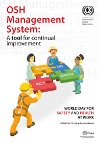Serbia resources
-

Supporting strategies to recover from the crisis in South Eastern Europe: country assessment: Serbia
10 October 2011
-
Employers’ Organisations’ Subregional Conference: Strengthening Social Dialogue to Meet Post-Crisis Opportunities and Challenges
How Employers’ Organisations can assist their members to meet the opportunities and challenges brought about by the economic and financial crises was one of the key topics at a meeting in Belgrade. Twenty one high level representatives from Employers’ Organisations from six countries* of the Western Balkans and Moldova participated in a two day Conference on 5 and 6 October 2011.
-

Commemoration of the World Day for Safety and Health at Work in Central and Eastern Europe
The 2011 World Day for Safety and Health at Work focused on the implementation of an Occupational Safety and Health Management System (OSHMS) as a tool for continual improvement in the prevention of workplace incidents and accidents. An OSHMS is a preventive method to implement safety and health measures which consists of four steps and incorporates the principle of continual improvement. Its principles are based on the PDCA Cycle: PLAN, DO, CHECK, ACT. Several events were organized in Central and Eastern Europe to celebrate the World Day and to highlight the importance of occupational safety in preventing workplace accidents.
-
Support to national efforts for the promotion of youth employment and management of migration (Mid-Term Joint Evaluation Summary)
11 April 2011
Project SRB/09/50/UND - Evaluation consultant: Dietmar Aigner
-
Closing Sub-regional Trade Union Seminar of the Project "Social Dialogue in Western Balkans and Moldova" Western Balkan countries and Moldova”
The objective of the event was to evaluate work done within the framework of the project, to analyze lessons learnt in the process of implementation as well as to map follow-up activities after the closure of the project.
-

Challenges and Solutions for Economic and Social Councils in the Western Balkans and Moldova at a time of crisis
01 January 2011
Report on the Sub-Regional Tripartite Conference on the Role of Economic and Social Councils in the Western Balkans and Moldova at a Time of Crisis
-
Collective bargaining is still weak in South Eastern Europe.
Collective bargaining could be a flexible and powerful tool to regulate terms and conditions of employment and relations between workers and employers, but it is still underdeveloped in most countries of South Eastern Europe.
-
Sub-regional Tripartite Conference on role and functioning of Economic and Social Councils in the Western Balkan countries and Moldova at a time of economic crisis
The meeting facilitated the transfer of knowledge, good practices and lessons learnt regarding the composition, role and proper functioning of national tripartite bodies from a number of more experienced Economic and Social Councils of EU member states to the newly created similar bodies in the Western Balkan countries and Moldova. The two day conference also aimed at facilitating networking and bilateral cooperation among participating institutions, to be followed by further exchanges of expertise. Special sessions were dedicated to the role and mandate of Economic and Social Councils at a time of economic crisis and how best ensure a more gender balanced representation in social dialogue institutions.
-

Good Practices in Providing Integrated Employment and Social Services in Central and Eastern Europe
01 January 2010
The fight against poverty and social exclusion is a central concern of the EU (European Union) and the Member States. The EU employment guidelines have, since the launch of the European Employment Strategy in 1997, focused on prevention of overall unemployment. The Lisbon strategy (March 2000) also contained explicit goals for the next decade to modernise the European social model, invest in people, combat social exclusion and eradicate poverty by 2010. Through the EU Social Protection and Social Inclusion Process, the EU coordinates and encourages Member States’ actions to combat poverty and social exclusion, and to reform their social protection systems.
-

Final evaluation report: Project youth employment partnership in Serbia
01 January 2010
Against a backdrop of economic restructuring, enterprise privatization and raising unemployment - especially among young people with low educational levels - the main thrust of the Project Youth Employment Partnership in Serbia, funded by the Government of Italy, revolved around two major components that combined the strengthening of the capacity of labour market institutions to implement youth employment policies with demonstration programmes directed at the creation of more and better jobs for youth.